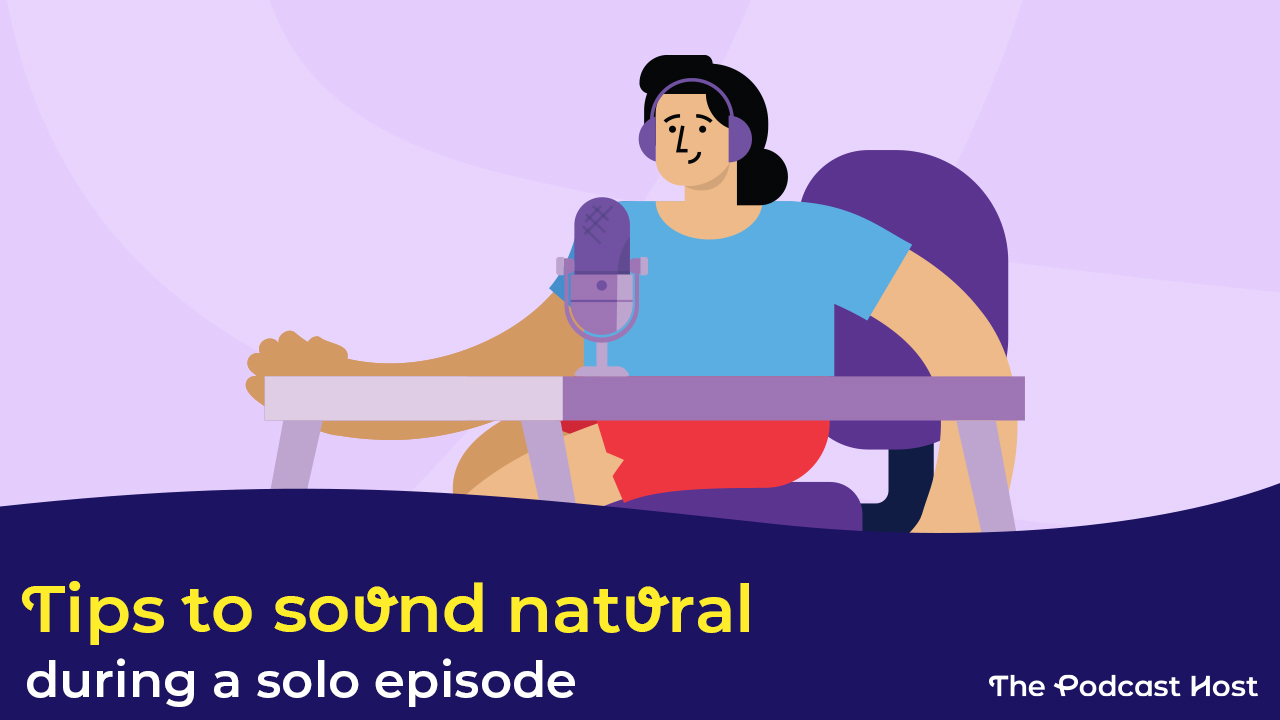Tips to Sound Natural During a Solo Podcast Episode

Many of us can indeed talk for hours about our podcast subject when there’s a guest or co-host to bounce off of. But when it’s just us doing a solo episode it can be a lot scarier. We can clam up or, worse, stop sounding like ourselves. Don’t worry. It happens to the best of us. And the good news is that there are tips and tricks to help you bring out your personality in these nervous moments.
Why Are Solo Episodes So Hard to Do?
So many more podcasters are choosing to run a solo podcast instead of a co-hosted or interview show with guests. The advantages of having a solo show are huge, but there’s also a certain awkwardness that can exist. This somewhat uncomfortable “I’m talking to myself” feeling can also creep in when you’re doing the occasional solo episode in an otherwise cohosted or interview show. Either way, have you ever wondered why it feels so odd to record when it’s only you in the room?
There’s a certain momentum to conversations, usually. You can almost feel the fluid back-and-forth motion. And it’s super hard to replicate that momentum when only one person is talking. This is especially true if you’ve recorded episodes with others. It takes practice to get over this feeling, but once you know how, you may even look forward to those quieter, solo recordings. Here are three methods I’ve used over the years to push past the awkwardness and lean into being as me as possible on the microphone.
Tip #1: Tap Into Your Social Self to Relax Your Voice
Early in my own solo podcast episodes, I noticed a few trends when my voice sounded different. If I recorded solo after talking to a friend or even after watching a fun video, I sounded more like me. My voice dropped to its normal range instead of a tighter, nervous higher pitch. And I had more bounce in my sentences. Also, if I was thinking of someone who would enjoy that episode, my voice had a softer tone. After a while of noticing these differences, I decided to try and reverse engineer them. I wanted to know how to sound more like my social self when recording awkward solo podcast episodes.
Here are some of my favorite things to do:
- Chat with a friend just before recording a solo podcast episode
- Have a photo of one of someone you adore either up on your computer screen or taped to the side of the screen. Look at it and talk to them during the recording.
- Leave a voice message for a friend on WhatsApp, Signal, etc., right before recording
- Watch a funny video before recording
These weren’t the only things I noticed, so let’s look at a few more ways I discovered to sound like my conversational self when recording alone.
Tip #2: Color Code Words to Guide Your Voice
During a voiceover class ages ago in San Francisco, I learned the power of color coding. This tip came flooding back to me when I started to record scripted intros and outros for my interview podcasts. It’s simple to do and easily customizable. Let’s look at some examples.
First, here’s an intro to my business podcast. I wanted to stress the words that are in pink. So when I say the pink phrases, I’ll slow my pace and smile to emphasize them. Also, the alternating black-pink colors will automatically make my voice into an up-down-up-down pattern that mimics natural intonation in English.

Personally, I like to color code the words themselves, but you can also highlight the words instead, as in the second example below. In this example, I color-coded the same words but used highlighting instead of changing the color of the words themselves. This is a personal preference.

You can even highlight words in different colors to mean different things if you wish. Blue can be sad, orange happy, and so on. This overcomplicates it for me, so personally, I stick to one color. This is a good place to start until you find which method works well for you. Remember, you’re listening to what color coding method makes your voice sound the most like you, not what looks good visually on the screen.
Tip #3: Use Hand Gestures to Bring Out Your Emotions
Exercising your voice is important, but we can’t forget about our bodies. I grew up with Italian hand gestures, so it’s natural for me to move my hands when speaking. In fact, I had to train myself to stop moving around so much when recording because this made a bunch of unwanted sounds.
Just as the color coding above can help you emphasize a word or phrase, a simple hand gesture can do the same. Do these hand gestures while talking and see how they change your voice.
- wave your hand
- bang your fist on a desk
- clap your hands
- put your hand up in the “stop” flat palm gesture
Did you hear your voice change? Good. It’s hard for our voices to reflect these emotional gestures. Use this to your advantage when trying to sound a certain way during a nervous solo podcast episode recording moment.
Start by taking notes as you watch videos, tv, or movies over the next week. What hand gestures are they using that you can do without making unwanted sounds during your solo recording? Also, ask your friends what hand gestures you often do. You probably overlook your own, so it’s good to enlist friends for this one. Slowly bring these into your recordings. The best part is that there’s no way to do the hand gestures wrong because no one can see them. Like the color coding above, it’s not about how it looks but how it makes your voice sound. Repeat the gestures that make you sound more natural, more like you.
Why Does a Lively Tone in Your Voice Matter for Your Solo Podcast Episodes?
Chances are you’re podcasting to find like souls that enjoy talking about your podcast topic. Though listeners will be drawn to your podcast for the topic, they’ll stay for you and your personality. So it’s important to make sure you sound like you as much as possible, even during nervous solo podcast episode moments. These tips can help you let your guard down and let listeners in, to get to know and adore you as much as we do, you wonderful podcaster!

